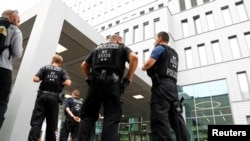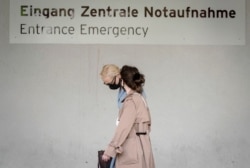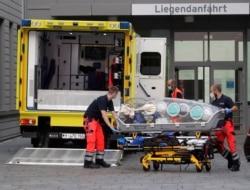The hospital treating gravely ill Russian opposition leader Aleksei Navalny since he was medically airlifted to Germany two days earlier said on August 24 that its tests indicate he was "poisoned."
Navalny "is in an intensive-care unit and is still in an induced coma," it said, adding that his health "is serious but there is currently no acute danger to his life."
The staunch anti-corruption campaigner and critic of President Vladimir Putin fell ill on August 20 during a flight from the Siberian city of Tomsk to Moscow.
The plane made an emergency landing in Omsk, where doctors put him into an induced coma.
"The clinical findings indicate intoxication by a substance from the group of active substances called cholinesterase inhibitors," a statement by the Charite hospital said.
Cholinesterase inhibitors, also known as anti-cholinesterase, are a broad range of chemicals that are found in several drugs but also in some pesticides and nerve agents.
Colleagues and supporters of Navalny have said he might have been poisoned when he drank tea purchased at the Tomsk airport.
A spokesman for Chancellor Angela Merkel, Steffen Seibert, told reporters in Berlin on August 24 that "protection is necessary" for Navalny because poisoning was suspected as "extensive" testing continued.
"We are dealing with a patient who, it is fairly likely, was poisoned," Seibert told reporters in Berlin.
"The suspicion is ... that somebody poisoned Mr. Navalny — that somebody seriously poisoned Mr. Navalny — which, unfortunately, there are some examples of in recent Russian history. So the world takes this suspicion very seriously," Seibert said on August 24.
"Because there is a certain probability of a poison attack, protection is necessary," Seibert said.
The Omsk regional Health Ministry, where Navalny was initially treated, said on August 22 that caffeine and alcohol were found in Navalny's urine, but "no convulsive or synthetic poisons were detected."
Dirk Wiese, the German government's coordinator for Eastern European affairs, told public broadcaster ZDF that the Russian opposition leader remains in critical but stable condition at Berlin's Charite hospital.
Security efforts
Wiese said German police have been posted as guards outside of Navalny's hospital room as a precaution.
Social media posts on August 24 also showed police increasing their presence around the hospital.
"The circumstances of what led to Aleksei Navalny's critical condition haven't yet been clarified," Wiese said.
Evacuation flight
Doctors at the hospital in Omsk initially refused to allow Navalny to be transferred to Germany, saying he was not in a fit state to be transported for treatment.
Navalny was flown to Berlin on August 22 on a plane chartered by a German nongovernmental organization after a daylong battle by Navalny's family and supporters to get Russian authorities to agree to allow him to go to the West.
Merkel extended an offer of treatment in Germany, saying news of Navalny's condition had "truly upset me."
Earlier on August 24, the head doctor of the Omsk hospital denied that medical personnel there had come under outside pressure from authorities.
"We treated the patient and we saved him. There was no interference in the treatment of the patient and there could not be any," Dr. Aleksandr Murakhovsky told a news conference in Omsk on August 24.
"The patient had a personal doctor, all decisions were made in a collegial manner, and every consultation involved up to 10 doctors from various institutions," Murakhovsky said.
When questioned about why law enforcement officers were present at the Omsk hospital, Murakhovsky said he could not say who it was and could not "say they were doing something."
Navalny's allies had accused doctors of holding up his medical evacuation to Germany. But the deputy chief of the Omsk hospital, Anatoly Kalinichenko, said on August 24 that Russian doctors had saved his life.
"We saved a life, stabilized [his condition], conducted a wide diagnostic search, arrived at, in our opinion, a correct diagnosis which allowed us to stabilize him and, per the relatives' wishes, got the patient to the condition when we decided that we could relatively safely allow to transport him," Kalinichenko said.
"I did not coordinate a single diagnosis with anyone," Kalinichenko said. "There was no pressure."
Consequences to health
Jaka Bizilj, founder of the Cinema for Peace Foundation, which arranged Navalny's evacuation flight out of Russia, was quoted by Bild newspaper as saying he thinks the Russian opposition leader will survive the "poison attack" but not without consequences to his health.
"From my point of view, the crucial question is whether he will survive this unscathed and continue to play his role," Bizilj told the German tabloid in a video interview on August 23. "If he survives this unscathed, which we all hope, he will surely still be out of the political arena for at least a month or two."
Navalny spokeswoman Kira Yarmysh said earlier that she thinks the politician was poisoned when he drank tea purchased at the Tomsk airport before he boarded the plane bound for Moscow.
According to a Russian newspaper report, Navalny had been under surveillance by Russian federal security agents during his recent trip to Siberia.
Officers with Russia's Federal Security Service (FSB) monitored Navalny's movements, the newspaper Moskovsky Komsomolets reported, citing information from sources in Russian security agencies. The surveillance involved plainclothes officers and CCTV cameras, the newspaper said.






